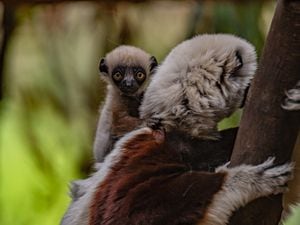Cute baby lemur a big deal for conservation at Chester Zoo
Conservationists at Chester Zoo become the first in Europe to successfully breed a rare Coquerel’s sifaka lemur.

The precious youngster arrived to parents Beatrice and Elliot, 18 months after the duo were moved from the USA to Chester Zoo to begin a vital new conservation breeding programme, designed to protect the crtically endangered primates from extinction.
Born with a thick fuzzy white coat and weighing just 119 grams, experts say the baby will cling tightly to mum’s belly for several weeks, before riding on her back like a backpack until around six months old.
Zookeepers will determine the sex of the tiny primate once it starts to branch away and explore on its own.
Sifaka are distinguishable from other lemurs because of the unique way that they move. They maintain an upright posture and, using only their back legs, spring side to side along the floor and leap more than 20ft through the treetops in a single bound - this unusual motion has seen them nicknamed ‘dancing lemurs’.
Currently only seven of the rare primates are cared for in three zoos in Europe and the family trio at Chester are the only Coquerel’s sifaka to live in the UK. Conservationists at the zoo say the birth is a ‘landmark moment’ for the species that is on the brink of extinction in the wild.
Mark Brayshaw, Curator of Mammals at the zoo, said:
“It’s really exciting to be the first team of conservationists in Europe to successfully breed this unusual and extremely rare primate.
“While it’s still early days, both mum and baby are doing great. Beatrice is feeding her new arrival regularly and is keeping it nestled in her fur as she leaps from tree to tree. In a few weeks’ time, the baby will graduate to riding on her back, before branching out and learning to climb trees independently at around six months old. It won’t be long until this bright-eyed baby will be bouncing 20ft between tree to tree just like its parents.”
Found only in the treetops of northwest Madagascar, the Coquerel’s sifaka lemur population has suffered an 80 per cent decline in just 30 years due to widespread deforestation. As a result, the world’s authority on the state of nature, The International Union for the Conservation of Nature (IUCN), upgraded the species to it’s highest conservation priority in 2018 and listed the primates as critically endangered in the wild.
Mike Jordan, Director of Animals and Plants at Chester Zoo, added: “The birth of a Coquerel’s sifaka in Europe is a real landmark moment for conservation and, importantly, has kickstarted the endangered species breeding programme in European zoos for the species – which could be the lifeboat that prevents them from becoming wiped out completely."





